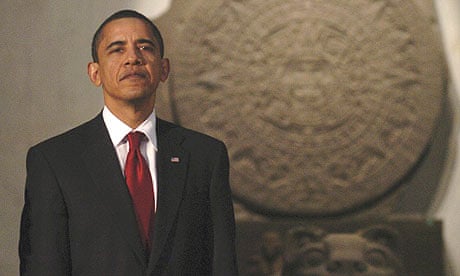Barack Obama today released four top secret memos that allowed the CIA under the Bush administration to torture al-Qaida and other suspects held at Guantánamo and secret detention centres round the world.
But, in an accompanying statement, Obama ruled out prosecutions against those who had been involved. It is a "time for reflection, not retribution," he said.
The memos provide an insight into the techniques used by the CIA and the legal basis on which the Bush administration gave the go-ahead.
In the first of the memos, dated 1 August 2002, the justice department gave the go-ahead to John Rizzo, then acting general counsel to the CIA, for operatives to move to the "increased pressure phase" in interrogating an al-Qaida suspect.
Ten techniques are approved, listed as: attention grasp, walling (in which the suspect could be pushed into a wall), a facial hold, a facial slap, cramped confinement, wall standing, sleep deprivation, insects placed in a confinement box (the suspect had a fear of insects) and the waterboard. In the latter, "the individual is bound securely to an inclined bench, which is approximately four feet by seven feet. The individual's feet are generally elevated. A cloth is placed over the forehead and eyes. Water is then applied to the cloth in a controlled manner........produces the perception of 'suffocation and incipient panic'."
'Walling' involved use of a plastic neck collar to slam suspects into a specially-built wall that the CIA said made the impact sound worse than it actually was. Other methods include food deprivation.
The techniques were applied to at least 14 suspects.
The Bush administration, in particular former vice-president Dick Cheney, claimed that waterboarding did not amount to torture but the Obama adminstration has ruled that it is. Obama ordered the closure of Guantánamo and the CIA secret detention sites abroad.
In spite of that, civil rights organisations have been disappointed by a series of rulings by the Obama administration that have protected a lot of material relating to Guantánamo and the sites abroad. The release of the memos today reversed that trend, though there will be unhappiness over the immunity from prosecution.
Obama, in a statement from the White House, said: "In releasing these memos, it is our intention to assure those who carrying out their duties relying in good faith upon the legal advice from the department of justice that they will not be subject to prosecution."
Anthony Romero, the ACLU executive director, said: "President Obama's assertion that there should not be prosecutions of government officials who may have committed crimes before a thorough investigation has been carried out is simply untenable."
The ACLU described the legal basis for torture as spurious.
Echoing the president, the attorney-general, Eric Holder, reiterated that there would be no prosecution of CIA operatives working within the guidelines set by the Bush administration."It would be unfair to prosecute dedicated men and women working to protect America for conduct that was sanctioned in advance by the justice department," Holder said.
The director of the CIA, Leon Panetta, told CIA employees that "this is not the end of the road on these issues", apparently in expectation of Congressional inquiries and court actions abroad. He promised legal and financial help for any CIA employees who faced such action.
In Spain, the chances of court action against six senior Bush administration members over the torture receded today after a ruling by the attorney-general, Candido Conde-Pumpido.
He said that any such action should be heard in a US court rather than a Spanish one, and that he would not allow Spain's legal system to be used as a plaything for political ends.
"If there is a reason to file a complaint against these people, it should be done before local courts with jurisdiction, in other words in the United States," he told reporters.
Spanish human rights lawyers last month asked Judge Baltasar Garzón, who indicted the former Chilean president Augusto Pinochet in 1998, to consider filing charges against the former US attorney-general, Alberto Gonzales, and five others.
